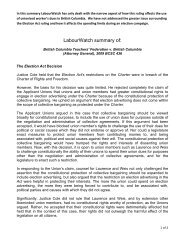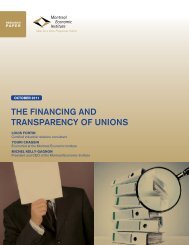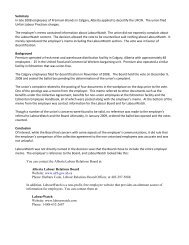to view the Dec 2008 Ontario Court of Appeal ... - LabourWatch
to view the Dec 2008 Ontario Court of Appeal ... - LabourWatch
to view the Dec 2008 Ontario Court of Appeal ... - LabourWatch
You also want an ePaper? Increase the reach of your titles
YUMPU automatically turns print PDFs into web optimized ePapers that Google loves.
On May 7, 2009 <strong>the</strong> Supreme <strong>Court</strong> <strong>of</strong> Canada dismissed <strong>the</strong> PSAC‐UTE application for Leave <strong>to</strong><br />
<strong>Appeal</strong>. This ruling stands.<br />
<strong>LabourWatch</strong> Summary<br />
In a significant decision limiting <strong>the</strong> rights <strong>of</strong> trade unions, <strong>the</strong> <strong>Ontario</strong> Superior <strong>Court</strong> <strong>of</strong> Justice has ruled that<br />
<strong>the</strong> courts will not enforce financial penalties levied by trade unions against members who choose <strong>to</strong> cross a<br />
picket line during a legal work s<strong>to</strong>ppage. The ruling in Birch and Luberti v. Union <strong>of</strong> Taxation Employees Local<br />
70030 will make it more difficult for trade unions <strong>to</strong> use <strong>the</strong> threat <strong>of</strong> fines and o<strong>the</strong>r penalties <strong>to</strong> enforce picket<br />
line solidarity. It will also enhance <strong>the</strong> right <strong>of</strong> employees <strong>to</strong> decide for <strong>the</strong>mselves whe<strong>the</strong>r <strong>the</strong>y wish <strong>to</strong><br />
participate in a work s<strong>to</strong>ppage.<br />
The decision was immediately appealed by <strong>the</strong> union in <strong>the</strong> <strong>Ontario</strong> <strong>Court</strong> <strong>of</strong> <strong>Appeal</strong>.<br />
The union lost in a 2 <strong>to</strong> 1 decision on <strong>Dec</strong>ember 3, <strong>2008</strong><br />
Background<br />
During a seven day PSAC strike in 2004, numerous members <strong>of</strong> <strong>the</strong> Union <strong>of</strong> Taxation Employees Local 70030<br />
(Union), a division <strong>of</strong> PSAC, decided <strong>to</strong> cross <strong>the</strong> picket line and report for work. The Union responded by<br />
imposing a fine on each member equivalent <strong>to</strong> <strong>the</strong> employee's gross salary for each day worked during <strong>the</strong><br />
strike. Many members refused <strong>to</strong> pay <strong>the</strong> fines, so <strong>the</strong> Union resorted <strong>to</strong> <strong>Ontario</strong>'s Small Claims <strong>Court</strong> <strong>to</strong><br />
recover <strong>the</strong> fines. The Union relied on a provision <strong>of</strong> its Constitution that purported <strong>to</strong> authorize <strong>the</strong> imposition<br />
and collection <strong>of</strong> fines.<br />
Jeffrey Birch and April Luberti were two Union members who crossed <strong>the</strong> picket line, were fined by <strong>the</strong> Union,<br />
and were subsequently sued by <strong>the</strong> Union in Small Claims <strong>Court</strong>. Instead <strong>of</strong> defending in Small Claims <strong>Court</strong>,<br />
Birch and Luberti jointly brought an application in <strong>the</strong> Superior <strong>Court</strong> <strong>of</strong> Justice seeking two orders: (1) a<br />
declaration that <strong>the</strong> <strong>Ontario</strong> courts will not enforce <strong>the</strong> Union's financial penalties, and (2) an order dismissing<br />
<strong>the</strong> Union's lawsuits in Small Claims <strong>Court</strong>. Birch and Luberti were represented in <strong>the</strong> Superior <strong>Court</strong> <strong>of</strong> Justice<br />
by John Craig and Richard Sinclair <strong>of</strong> Heenan Blaikie LLP.<br />
The Oc<strong>to</strong>ber 2007 <strong>Dec</strong>ision<br />
Justice Smith ruled in favour <strong>of</strong> Birch and Luberti on all <strong>the</strong> issues and granted <strong>the</strong> orders <strong>the</strong>y were seeking.<br />
Justice Smith based his decision on <strong>the</strong> following considerations.<br />
First, nei<strong>the</strong>r Birch nor Luberti had availed <strong>the</strong>mselves <strong>of</strong> an internal appeal that was permitted under <strong>the</strong><br />
Union's Constitution. The Union argued that failure <strong>to</strong> take advantage <strong>of</strong> an internal Union appeal meant that<br />
Birch and Luberti could not seek <strong>the</strong> assistance <strong>of</strong> <strong>the</strong> courts. Justice Smith disagreed, pointing out that <strong>the</strong><br />
Union had resorted <strong>to</strong> <strong>the</strong> courts by suing Birch and Luberti. Birch and Luberti were entitled <strong>to</strong> defend<br />
<strong>the</strong>mselves regardless <strong>of</strong> <strong>the</strong> existence <strong>of</strong> an internal Union appeal mechanism.<br />
Second, Justice Smith confirmed <strong>the</strong> common law position that <strong>Ontario</strong>'s courts will not enforce penalty clauses<br />
in contracts. The Union's Constitution was effectively a contract between <strong>the</strong> Union and its individual members.<br />
Therefore, if it contained a penalty clause, <strong>the</strong>n that clause would not be enforceable in <strong>the</strong> courts. Justice Smith<br />
considered <strong>the</strong> specific provision <strong>of</strong> <strong>the</strong> Union Constitution at issue. He concluded that <strong>the</strong> provision permitted a<br />
financial penalty <strong>to</strong> be imposed that was excessive since <strong>the</strong> penalty (i.e. gross salary for <strong>the</strong> time worked) bore<br />
1 <strong>of</strong> 2
no relation whatsoever <strong>to</strong> actual losses suffered by <strong>the</strong> Union as a result <strong>of</strong> members crossing <strong>the</strong> picket line.<br />
The financial penalty <strong>the</strong>refore fell in<strong>to</strong> <strong>the</strong> category <strong>of</strong> penalties that will not be enforced by <strong>the</strong> courts.<br />
Third, <strong>the</strong> Union argued that <strong>the</strong> financial penalties were not unconscionable in <strong>the</strong> labour relations<br />
circumstances and <strong>the</strong>refore should be enforced in <strong>the</strong> courts. Justice Smith disagreed, finding that <strong>the</strong> financial<br />
penalties were "extremely onerous" and based on speculative assumptions. Significantly, he rejected <strong>the</strong> idea<br />
that a financial penalty for picket line crossing could be based on <strong>the</strong> supposed financial benefit <strong>of</strong> such crossing<br />
<strong>to</strong> <strong>the</strong> employer. The Union also asserted that <strong>the</strong> financial penalties were justifiable <strong>to</strong> deter "free riders" who<br />
would benefit from strike activity while continuing <strong>to</strong> report <strong>to</strong> work. In response, Justice Smith observed that<br />
trade unions should use strategies o<strong>the</strong>r than onerous financial penalties <strong>to</strong> encourage respect for picket lines<br />
(e.g. persuasive information campaigns and better strike pay).<br />
Fourth, Justice Smith rejected <strong>the</strong> submission that <strong>the</strong> Public Service Labour Relations Act (PSLRA) authorized<br />
<strong>the</strong> imposition <strong>of</strong> financial penalties for crossing a picket line. The relevant provisions <strong>of</strong> <strong>the</strong> PSLRA are very<br />
similar <strong>to</strong> provisions <strong>of</strong> <strong>the</strong> Canada Labour Code. At best, <strong>the</strong>se PSLRA provisions refrain from making it an<br />
unfair labour practice for unions <strong>to</strong> levy financial penalties against <strong>the</strong>ir members. However, <strong>the</strong>re would have<br />
<strong>to</strong> be a clear statu<strong>to</strong>ry provision authorizing such penalties before <strong>the</strong> courts would enforce <strong>the</strong>m.<br />
The <strong>Dec</strong>ember <strong>2008</strong> <strong>Appeal</strong> <strong>Dec</strong>ision<br />
In a 2 <strong>to</strong> 1 decision, <strong>the</strong> majority <strong>of</strong> <strong>the</strong> <strong>Court</strong> <strong>of</strong> <strong>Appeal</strong> agreed with <strong>the</strong> application judge and held that <strong>the</strong><br />
provision in UTE's constitution authorizing <strong>the</strong> imposition <strong>of</strong> fines is unconscionable and <strong>the</strong>refore<br />
unenforceable. In applying <strong>the</strong> unconscionability test, <strong>the</strong> majority found that <strong>the</strong>re was an inequality in<br />
bargaining power between <strong>the</strong> parties and that, you as <strong>the</strong> respondents did not have much choice in agreeing <strong>to</strong><br />
<strong>the</strong> inclusion <strong>of</strong> such penalty provisions in <strong>the</strong>ir collective bargaining agreement. Moreover, <strong>the</strong> majority found<br />
that <strong>the</strong> penalties imposed were excessive. While <strong>the</strong> court recognized that union solidarity is a fundamental<br />
principle <strong>of</strong> <strong>the</strong> union movement and <strong>the</strong> collective bargaining process, <strong>the</strong> court found that <strong>the</strong> means adopted<br />
<strong>to</strong> achieve such solidarity were "very unfair". As such, <strong>the</strong> majority <strong>of</strong> <strong>the</strong> court found no basis <strong>to</strong> interfere with<br />
<strong>the</strong> decision <strong>of</strong> <strong>the</strong> application judge. As agreed by <strong>the</strong> parties at <strong>the</strong> conclusion <strong>of</strong> <strong>the</strong> oral arguments, <strong>the</strong> court<br />
awarded costs in <strong>the</strong> amount <strong>of</strong> $3,000 in our favour.<br />
In a dissenting decision, Juriansz J.A. found that <strong>the</strong> fine was not unconscionable and that <strong>the</strong> common law<br />
rules that penalties are per se unenforceable does not apply <strong>to</strong> <strong>the</strong> disciplinary provisions <strong>of</strong> a union constitution.<br />
Justice Juriansz found that (i) <strong>the</strong>re was no inequality <strong>of</strong> bargaining power; (ii) <strong>the</strong> amount <strong>of</strong> <strong>the</strong> fine was not<br />
unfair when considered in light <strong>of</strong> <strong>the</strong> actual damage suffered by <strong>the</strong> union; and (iii) <strong>the</strong> disciplinary provision is<br />
not inherently unenforceable as a penalty. As such, Justice Juriansz would allow <strong>the</strong> appeal.<br />
2 <strong>of</strong> 2







